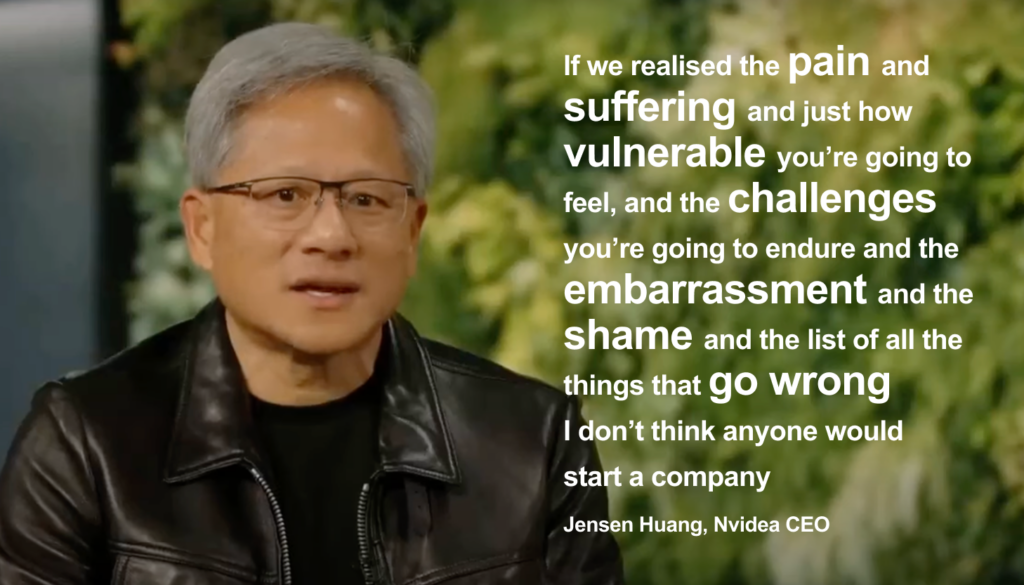
Beneath the hustle: Rethinking strategic support for entrepreneurs
Nicole MacLeod and Simon Myers
December 2024
Most new ventures fail, despite a sprawling support system – technical, legal, financial and social. Working with founders in a new on-demand format focused on strategic challenges has made us think about how existing support structures need to be augmented for today’s entrepreneurial generation.

Jensen Huang talking to Acquired. Watch the video here
Jensen Huang famously said if he had the choice to start Nvidia again, he wouldn’t. Why? He doesn’t refer to technical skills or access to capital. He talks about the cognitive and emotional load of being an entrepreneur.
It’s something we often encounter when working with founders in the thick of it. But isn’t openly discussed. The process takes them so much longer than they expect, and the odds of success are stacked against them. Yes, as Huang points out, not knowing how hard it is, is the entrepreneur’s super power… but that doesn’t take away from the reality of what they endure, and the impact it has on their strategic decision making.
It seems to us there is an unmet need that sits between personal empathy, business advice and decision making. Where entrepreneurs need a more real, immediate and useful support intervention that is in the moment and recognises the questions not just the assumed answers. What would that strategic support service look like?
#1 Drop the performance
So much of business is performative. Just open a Linkedin feed. It’s exhausting and eyeroll inducing because we all know it’s not reality. “A performance of confidence to conceal uncertainty” as William Kentridge would put it if he ever felt inclined to comment on the matter. Most founders struggle to openly communicate their stress, perhaps because they don’t want to be considered “weak” or “unprepared”. Keeping it to themselves leads to a feeling of isolation, compounding the stress.
“A startup is a lonely place. You are working on something that no one believes in, that you’ve been told time and time again will never work. It’s you against the world.”
Marc Randolph, Netflix Co-Founder
It’s exhausting to always be selling. To always have the answers. To never show doubt. It gets in the way of tackling challenges and making the right decisions. These are difficult conversations to have with your investors, your employees or even your family and friends. Entrepreneurs need to find people they can talk to who can be free of judgement and open to all topics. Honesty, calmness and safety makes creative thoughts and better decision making possible.
→ Creating a space free of judgement, removing the fake-it-till-you-make-it mask to have honest conversations that get to the heart of the matter.
#2 The Best Next Move
“You want to surf the edge of chaos, with just enough process to stay upright, but not so much that you can’t flex to catch a passing wave.”
Dominic Jacquesson, Index Ventures
Adaptability and agility are not alien concepts to younger entrepreneurs, who grew up on a diet of digital innovation. But some of the ingrained business systems and logic fights the need for constant change.
Leaders can’t afford to stubbornly plough away with the latest strategy playbook. Or wait for the annual strategy retreat to figure out a pressing concern. They need to turn on a dime, constantly iterating, without losing focus.
At the end of the day, strategy is about getting rid of stuff. Making decisions. As the Chief Decision Maker, founders carry an enormous weight of responsibility to “get it right”. Introducing conversations that follow the rhythm of the business and the outside world, to explore strategic decisions with intent at regular intervals breaks down a challenge into what would be the best next step. Building the mental muscle to deal with the constant barrage of endless choices and trade offs. So even if the grand plan has to be torn up, there is confidence and clarity in the best next move.
→ Deciding on a nimble course of action to deal with the moments when the grand strategic plan doesn’t survive contact with reality.
#3 Listening in stereo
Successful entrepreneurs are smart people. They have the ideas. Sometimes too many (thanks, AI). When sitting face to face with an entrepreneur, it’s less about adding to the noise, and more about bringing clarity and calm, to clear the way for them to make better decisions.
Listening, not talking. Four ears are even better than two, which is why we prefer to approach every conversation as a double act. It’s powerful to have two people sitting down with the sole purpose of (really) listening to you.
When we focus on asking questions rather than giving answers, the magic happens. By giving entrepreneurs the chance to offload what’s really on their minds, we get to “read the air” as the Japanese would say – discern their feelings, expose the backstory, and use emotional intelligence to make sense of the cold hard business facts. Often, it just takes them to hear themselves say it out loud to realise it, or even believe it.
→ Moving from a monologue broadcast to a discursive dialogue, where special attention is paid to really hearing what is said and unsaid.
#4 Advice is nice, but
The world is awash with armslength advice for entrepreneurs. No longer the realm of only academic institutions, mentors and incubators, there’s also plenty of free content (from events to Youtube, and yes, even Tiktok). But as helpful as these resources may be, there is no cut and paste magic formula for the next generation of businesses. Founders are facing a very different set of circumstances to even 5 years ago (geopolitics, workplace dynamics, AI, climate change, etc.) – so what does it all mean for their unique scenario?
What founders really need is to work through their strategic challenges in a tangible way that gets them closer to an answer. With people who are prepared to sit side-by-side with them and get stuck in, not just impart knowledge. Working out the answer together is infinitely more powerful and energising than being told what to do. And makes for decisions that mean you can sleep at night.
→ Access to experienced counsel prepared to sit side by side, apply the learnings and get stuck in.
#5 Permission to breathe
“You can pick the most successful high-growth company in the world, and insiders will still say it’s a shitshow”.
Andrew Robb, COO (former), Farfetch
Building a business is messy. It’s an always-on process that is unrelenting. A “shitshow” as some have called it more bluntly. And the new wave of entrepreneurs look set to bring on a whole lot more messiness with their hustle culture (non-trad work hours and a multiplicity of hats). In the chaos of the day-to-day, the Urgent is stealing from the Important. But successful strategy demands the longer term view, the bigger picture.
Many entrepreneurs we work with complain about not finding the time or means to have productive conversations with their teams, or the headspace to think on their own. We’re not talking about casual bean-bag chats and check-ins. Or monologues with ChatGPT. We’re talking dedicated time and space with other human beings to offload, probe and find clarity of thought. Quality reflection (with others) is the precursor to more effective action. Even in a small amount of time, structured and objective conversation around a specific challenge can flush out answers faster.